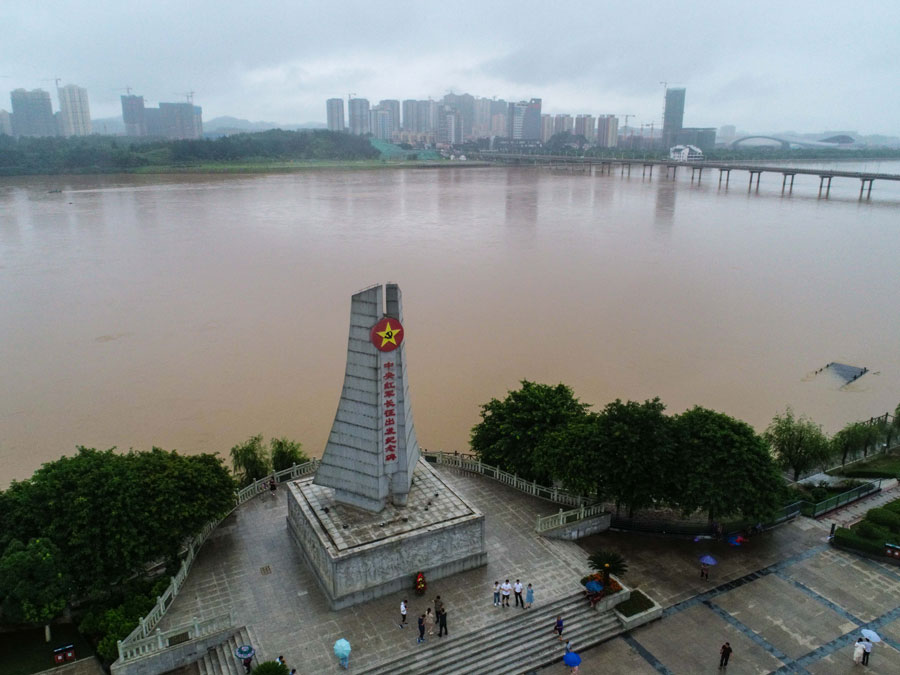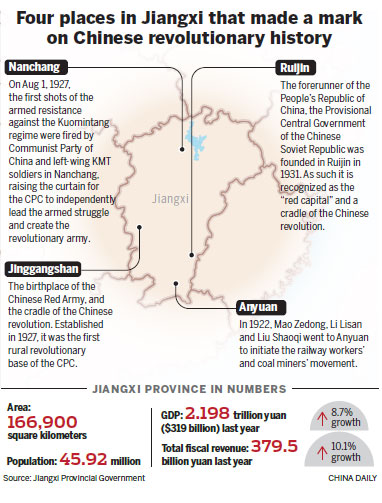Where loyalty ran deep for Long March ahead


The soldiers of Xingguo and Yudu counties have a special place among Red Army's 'unbeatable' fighters
Editor's Note: As the People's Republic of China prepares to celebrate its 70th anniversary on Oct 1, China Daily is featuring a series of stories on the role regions have played in the country's development and where they are today.
In his book Red Star over China, writer Edgar Snow describes the Red Army soldiers who took part in the Long March as "unbeatable" fighters who had demonstrated "sheer dogged endurance".
Snow, an author from the United States, in 1936 witnessed firsthand the soldiers' "ability to stand hardship without complaint" at the makeshift headquarters of the Communist Party of China in Bao'an, located near the city of Yan'an, Shaanxi province,
His book details how the Red Army trekked over mountains and crossed rivers with little food while dodging enemy pursuers in the Long March to Yan'an.
Though it has been more than eight decades since the successful conclusion of the Long March, people will find Snow's description of the soldiers' courage and doggedness no exaggeration if they visit Ganzhou, Jiangxi province, where many Red Army soldiers came from and where the 12,500-kilometer journey officially started.
An 8-meter high wall comprising more than 700 pieces of black marble will impress all visitors to the Xingguo Revolutionary Martyrs' Memorial. On the walls of the monuments are inscribed the names of 23,179 revolutionary martyrs.
"The actual number of martyrs from Xingguo is far beyond the number of names on the wall because survivors failed to remember or even know the names of many of their deceased comrades," said Huang Hong, a guide and interpreter at the memorial.
Young volunteers
Some of the names have four Chinese characters instead of three used for most Chinese names. Huang said this is because these soldiers died before they reached 18, an age when they could be given a formal name according to local customs. As they died so young, their family names have to be followed with their childhood names, which usually consists of two or three characters.
Many of the young soldiers belonged to the 15th division of the Red Army, which consisted of members of the Young Pioneers of China and the Communist Youth League. The average age of soldiers in the division was about 18, Huang added.
Established in 1933, the division was incorporated into two other divisions in 1935 after it lost most of its more than 8,000 soldiers in the Long March, which lasted from 1934 to 1936.
"For about every kilometer of distance in the Long March, one Xingguo soldier died," Huang explained.
From 1929 to 1934, more than 90,000 Xingguo residents joined the Red Army or fought alongside the army. The total population of the county only stood at 230,000 at the time, said Liu Kailian, honorary president of the Xingguo Red Land Research Society, which concentrates on local communist history research.
He said communism was so widely accepted in Xingguo that one in every 100 natives was a Party member in 1932. All members of the Young Pioneers of China and the Communist Youth League in some townships in the county joined the Red Army. Some youngsters even lied about their age so they could be recruited.
"Many Xingguo people joined the army because they knew that the army fought for the toiling masses and for a new China," he said.
It was not unusual to see mothers and wives support loudly their menfolk's decision to join the army, and escort them all the way through as they went to sign up. In some families, all the sons signed up together, according to the memorial.
Li Meiqun from Lianjiang township, urged her second husband to join the army even though her first spouse, also a soldier, had been killed by the enemy. Li herself placed her infant daughter in the care of a local family and became a guerrilla fighter after the army embarked on the Long March. She was captured by the enemy and died in prison in 1936.
When 86,000 Red Army soldiers gathered in Yudu county, Ganzhou, in 1934 to officially embark on the Long March, the army also had a lot of support from local people.
They collected any large pieces of timber available, including doors and unused coffins, to build five temporary bridges over the 600-meter wide Yudu River to help soldiers cross, said Tan Ying, a guide and interpreter of the Memorial for the Departure of the Central Red Army's Long March in Yudu.
"They built the bridges after darkness fell and dismantled them and hid all the timber so they would not be discovered by enemy aircraft," she said.
She said about 17,000 Yudu soldiers took part in the Long March but only 277 of them lived to see the foundation of the People's Republic of China in 1949.
Fighting injustice
Liu Jiang's grandfather Liu Lian joined the Red Army in 1930 at the age of 16. The veteran, who once worked with some famous Chinese generals including Xiang Ying, deputy commander of the New Fourth Army before he was assassinated in 1941, and Zhu De, one of the 10 marshals of the People's Liberation Army, never changed his belief in the Party though he narrowly escaped death multiple times.
Liu Lian was captured in Xingguo in 1935 while fighting as a guerrilla. He lied to his captors, telling them he was a transportation worker, and was eventually set free after two years in prison, said Liu Jiang, 45, an official in the Xingguo government.
Soon after getting out of prison in 1937, Liu Lian walked more than 200 km to try and rejoin his fellow fighters. He slept in graveyards at night to avoid being found by the enemy. The veteran, however, failed to find his comrades, said his grandson.
But Liu Lian picked up a gun again after getting in touch with the Party in 1938 and joined the New Fourth Army. In January 1941, the Nationalist forces surrounded and destroyed the army's headquarters and most of the 9,000 soldiers were killed.
Liu Lian was one of 2,000 who survived. He was determined to return to the army and eventually rejoined it, Liu Jiang said.
Zhang Chunming's father Zhang Fangyi became a nurse in the Red Army in 1933 aged 17, and was one of more than 600 Xingguo soldiers who completed the march.
Zhang Chunming, 68, said his father's reasons for joining up typified the injustices suffered by people at that time.
His father was a craftsman who should have been able to make a decent living. He made sandals and rain capes from straw and also had expertise in fluffing cotton to make it soft enough to be used in bedding. However, he was not properly fed or clothed because of exploitation by landlords, said Zhang Chunming, a retired doctor in Xingguo.
"My father failed to get his wages from the landlords and one of them even set his dog on him. Sometimes, he worked for the landlords but he finally owed money to them rather than getting paid. It was an unequal society," he said.
The legacy continues
A frequent visitor to a Red Army hospital in Xingguo to offer help, Zhang's father was moved by what Snow described as "sheer dogged endurance" in his book.
"He was deeply impressed that the Red Army soldiers braved bad weather and were never afraid of shedding their blood and laying down their lives to fight for people's happiness. He then vowed to be a soldier like them though he had no idea about what the Party was then," Zhang Chunming said.
Before Zhang Fangyi passed away in 1998, he repeatedly stated the reason the Long March succeeded was because of unwavering trust and belief they would triumph. The veteran said he and his comrades often had to eat tree bark and grass roots. It was also not unusual that they boiled leather belts from the enemy for food.
All Zhang Chunming's seven siblings are going to retire this year, and they have decided to pass their father's spirit on by collating over 10 bundles of his handwritten papers into a book.
"We deeply know that our honor does not come from being decedents of a Red Army veteran, but from passing on the aspirations of our father's generation," he said.
The seven siblings will not be alone in passing their father's spirit on.
During his visit to Yudu on May 20, President Xi Jinping, also general secretary of the Communist Party of China Central Committee, paid tribute to a monument marking the departure of the Long March and noted China is on "a new Long March".
He said that the country will depend on the firm faith and strong will of the whole Party and all people to overcome major challenges at home and abroad and secure new victories in building socialism with Chinese characteristics.

- Legal tools essential for AI regulation
- China launches remote-sensing satellite for Algeria
- China reports drop in workplace accidents, fatalities in 2025
- From Kansas to karst: Unpacking Guangxi's charms
- China carries out nearly 8.5m hectares of land greening in 2025
- Chongqing red leaf festival draws record 4.7 million visitors




































